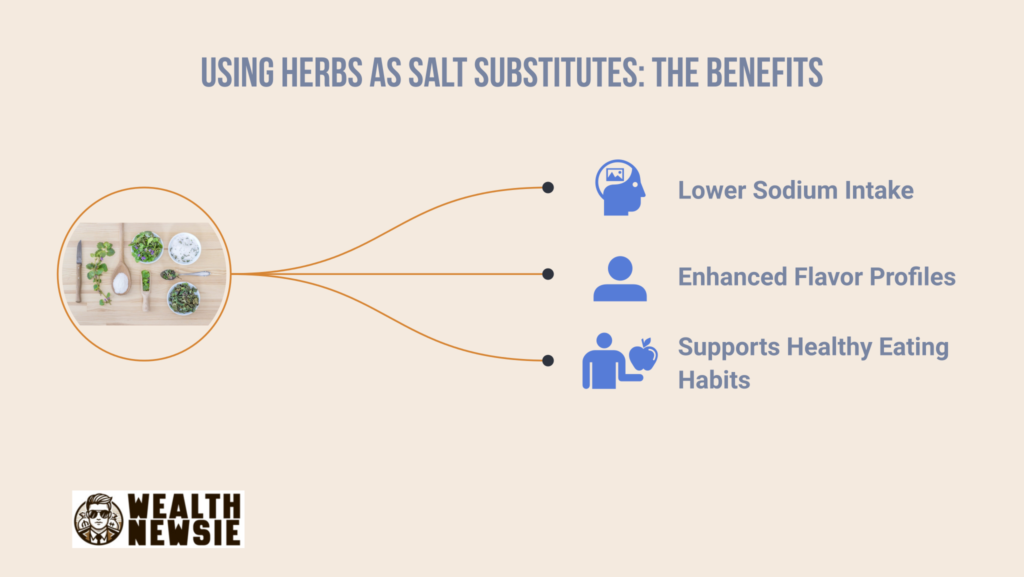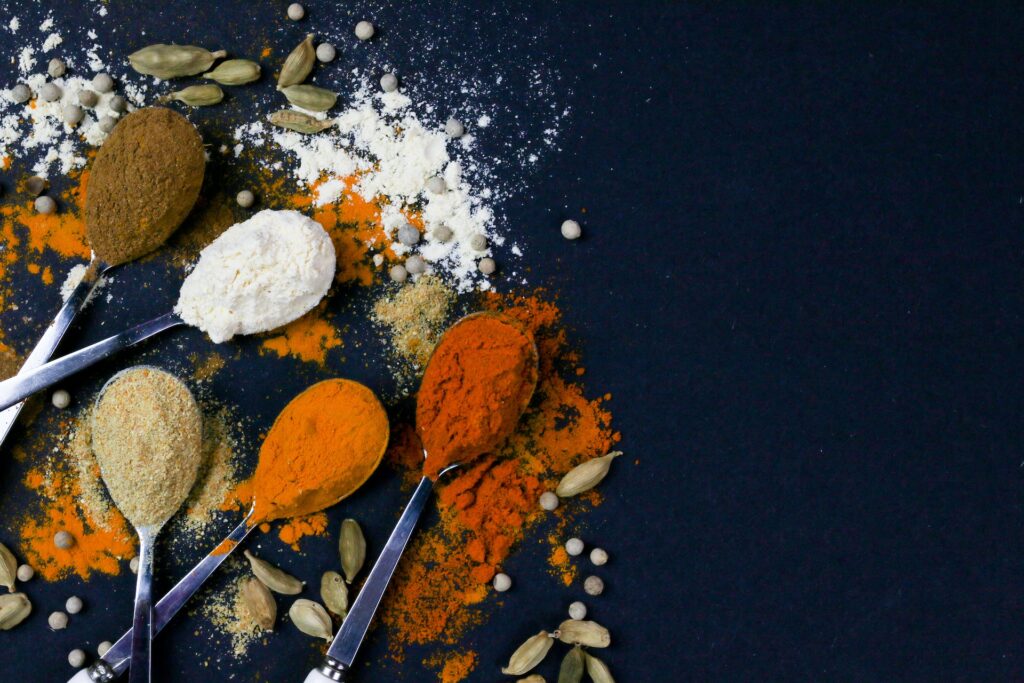Herbs may add taste to foods while reducing salt intake. Herbs taste good and are healthy. This article describes how using herbs as salt substitutes adds taste to a balanced diet.
Rosemary, thyme, oregano, and basil enrich meals without salt. Sprinkle these fragrant herbs on dishes to flavor and smell. Try experimenting with various herbs as a pleasant salt substitute and a source of antioxidants and minerals to enhance your recipes.
The next sections will cover herbs as salt substitutes to help you cook healthier without sacrificing taste. Whether you’re reducing salt or trying new flavors, herbs can improve your favorite foods.
The Health Hazards of Excessive Salt

With heart disease and high blood pressure, too much salt might be harmful. Sodium-rich salt can increase blood volume and pressure by retaining water. Increased artery pressure can strain the heart and cause heart disease.
Hypertension is often caused by excessive salt consumption. Elevated sodium levels cause fluid retention and blood pressure as the kidneys try to eliminate salt. Over time, this can damage and restrict blood arteries, raising heart disease and stroke risk.
Reduce your salt intake and use herbs instead to reduce these health risks. Natural and delicious herbs enhance the taste of your meals without salt.
Herbs also include antioxidants, vitamins, and minerals that promote health. Add herbs to your cooking for taste and heart health.
Benefits of Using Herbs as Salt Substitutes

Foods made using herbs instead of salt are healthier. Herbs offer flavor and health advantages to foods. Adding herbs to your food adds flavor without salt. There are several benefits of utilizing herbs as salt substitutes:
✔️Lower Sodium Intake:
High salt intake can lead to health issues like high blood pressure and heart disease. Herbal salt substitutes can considerably reduce sodium intake and improve cardiovascular health.
Vitamins, minerals, and antioxidants are abundant in herbs, making them necessary for optimum health. You can get more of these nutrients by eating a variety of herbs.
✔️Enhanced Flavor Profiles:
Experiment with herbs’ diverse flavors and smells to create unique taste combinations. Herbs improve flavor and make meals more pleasurable.
A wide range of herbs are accessible, each with unique flavors and culinary applications. There are limitless herb salt replacements, from basil and rosemary to mint and thyme.
✔️Supports Healthy Eating Habits:
Introducing herbs as salt alternatives promotes flavor exploration and experimentation in cooking. Discovering new ways to flavor your meals with natural ingredients can lead to a more varied and healthful diet.
Herbs and salt reduction can help you produce delicious, healthy meals. Explore herbs and discover their unlimited possibilities for improving the taste and nutritional value of your dishes.
Popular Herbs for Salt Substitution

Herbs are a great way to make food taste great while cutting down on salt. You can eat these greens and feel better at the same time. You can use these plants instead of salt:
1: Mint
Mint tastes clean and cool. It goes well with drinks, soups, and marinades.
2: Rosemary
Rosemary tastes strong and bitter. A roasted meat, potatoes, or veggies go well with it.
3: Nutmeg
Nutmeg tastes warm and a little sweet. It can be added to soups, baked goods, and rich sauces.
4: Basil
Basil is a well-known herb that tastes sweet and a little spicy. People love it in Italian food, especially with pasta, peppers, and cheese.
5: Cardamom
Cardamom has a unique smell and goes well with sweet and savory foods, like cakes, curries, and chai tea.
6: Cinnamon
Cinnamon gives food warmth. Along with soups, desserts, and warm drinks, you can use it in both sweet and savory recipes.
You can use these plants instead of salt to make your food healthier and taste better. You can mix and match different ingredients to make healthy, tasty meals.
How to Use Herbs as Salt Substitutes
Incorporating herbs into your cooking is a simple and effective way to add flavor to your meals while reducing salt intake. Whether you prefer fresh herbs or dried herbs, there are various ways to incorporate them into your dishes to enhance the overall taste. Here are some tips on how to use herbs as salt substitutes:
🌿Experiment with Different Herb Combinations:
Try combining different herbs to create unique flavor profiles. For example, you can mix basil, oregano, and thyme for an Italian-inspired dish or cilantro, cumin, and lime for a Mexican-inspired flavor. Don’t be afraid to get creative and explore different herb combinations to suit your taste preferences.
🌿Use Herbs during Cooking:
Add herbs to your dishes while cooking to infuse the flavors into the food. For soups, stews, and sauces, add the herbs at the beginning of the cooking process to allow the flavors to develop. If you’re grilling or roasting meats, sprinkle herbs on top or create herb rubs to enhance the taste.
🌿Sprinkle Herbs as a Garnish:
Amp up the flavors of your dishes by using herbs as a final garnish. Sprinkle fresh herbs, such as parsley or basil, on top of salads, pasta dishes, or roasted vegetables. The vibrant colors and aromatic scents of the herbs will not only elevate the taste but also make your dishes visually appealing.
Delicious Recipes Using Herbs as Salt Substitutes

When it comes to using herbs as salt substitutes, the possibilities are endless. Not only do herbs add flavor and depth to dishes, but they also offer a healthier alternative to sodium-laden salt. Here are some delightful recipes that showcase the versatility of herbs and create flavorful meals without sacrificing taste:
🍖Herb-Roasted Chicken
Combine a variety of fresh herbs, such as rosemary, thyme, and sage, with olive oil, garlic, and lemon juice. Rub the mixture onto chicken pieces before roasting them in the oven. The herbs infuse the chicken with aromatic flavors, resulting in a succulent and delicious main course.
🍖Zesty Herb-Marinated Shrimp Skewers
Marinate shrimp in a mixture of chopped cilantro, parsley, garlic, lime juice, and olive oil. Thread the shrimp onto skewers and grill them for a few minutes on each side until they turn pink and slightly charred. These herb-marinated shrimp skewers are bursting with tangy and herbaceous flavors.
🍖Fresh Herb Salad with Lemon Vinaigrette
Create a refreshing and vibrant salad by tossing together a combination of fresh herbs such as basil, mint, and dill. Drizzle a tangy lemon vinaigrette made with olive oil, lemon juice, honey, and Dijon mustard over the salad. This herb-packed salad makes for a delightful side dish or a light lunch.
By incorporating these flavorful herb recipes into your cooking repertoire, you can enjoy the benefits of using herbs as salt substitutes while creating delicious and healthier meals.
Challenges and Tips for Using Herbs as Salt Substitutes
Transitioning from salt to herbs as substitutes in your cooking may present some initial challenges. Your taste buds may need time to adjust to the new flavors, as salt has a distinct taste that can be difficult to replicate. However, with some patience and experimentation, you can successfully incorporate herbs into your meals for a healthier and more delicious experience.
One of the main challenges is finding the right balance of flavors when substituting herbs for salt. Start by gradually reducing the amount of salt you use and gradually increasing the amount of herbs in your dishes. It will allow you to adapt to the new flavors without overwhelming your taste buds. Experiment with different herb combinations to create unique and appealing taste profiles that suit your preferences.
Another challenge is determining the appropriate quantity of herbs to use. While herbs add flavor, they can vary in intensity. It’s important to adjust the amount according to your personal taste. Remember that fresh herbs tend to have a stronger flavor compared to dried herbs. Consider using fresh herbs when you want a more pronounced taste and dried herbs for convenience and a longer shelf life.
Tips for Using Herbs in Cooking:
- Start by reducing the amount of salt gradually and increasing the amount of herbs in your dishes.
- Experiment with different herb combinations to find your preferred flavor profiles.
- Consider using fresh herbs for a stronger flavor and dried herbs for convenience.
- Try different cooking techniques, such as infusing oils with herbs or making herb rubs for meats.
- Explore various recipes that specifically incorporate herbs as salt substitutes.
By following these tips and being open to new flavors and combinations, you can successfully use herbs as salt substitutes in your cooking. Embrace the challenge and enjoy the journey towards healthier and more flavorful meals!
Expert Advice on Using Herbs as Salt Substitutes
When using herbs as salt substitutes in your cooking, expert advice can help you make the most of these flavorful alternatives. Culinary professionals and nutrition experts recommend incorporating herbs into your meals to enhance taste and promote better health. Here are some valuable tips from the experts:
🔴Experiment with Different Herbs:
Culinary professionals emphasize the importance of trying various herbs to discover unique flavor combinations that suit your taste preferences. Don’t be afraid to step out of your comfort zone and explore the world of herbs.
🔴Consider the Intensity of Flavors:
Different herbs have different flavor profiles, ranging from mild to bold. Experiment with the intensity of flavors by using herbs in varying quantities. Start with a smaller amount and gradually increase it until you achieve the desired taste.
🔴Balance the Flavors:
Combining multiple herbs can create a harmonious flavor balance in your dishes. Pay attention to complementary flavors and experiment with different herb combinations to enhance the overall culinary experience.
🔴Incorporate Herbs into Various Dishes:
Don’t limit yourself to using herbs solely as a salt substitute. Culinary experts recommend incorporating herbs into a wide range of dishes, including salads, soups, sauces, and marinades. It allows you to explore different cooking techniques and maximize the flavors.
By following these expert tips, you can make the most of herbs as salt substitutes and elevate the taste of your meals to a whole new level. So, start experimenting with herbs in your cooking and enjoy the flavorful benefits they provide!
The Impact of Using Herbs as Salt Substitutes on Overall Health
Using herbs as salt substitutes can have a significant impact on your overall health. By reducing your salt intake and incorporating herbs into your meals, you can enjoy the following health benefits:
☑️Lowered Blood Pressure
Excessive salt consumption is linked to high blood pressure, but by using herbs instead, you can reduce your sodium intake and promote healthier blood pressure levels.
☑️Improved Cardiovascular Health
Excess salt can contribute to heart disease and stroke, but incorporating herbs as salt substitutes can help lower your risk of these conditions and support better heart health.
☑️Increased Antioxidant Intake
Herbs are rich in antioxidants, which can help protect your cells from damage caused by harmful free radicals and potentially reduce the risk of chronic diseases.
☑️Enhanced Flavor and Variety
Using herbs as salt substitutes not only adds delicious flavor to your meals but also allows you to experiment with a wide range of tastes and aromas, making your dishes more enjoyable.
Changing from salt to herbs may take some time to adjust, but the benefits to your overall health are well worth it. Incorporating herbs into your meals can help create flavorful and satisfying dishes while caring for your well-being.
Frequently Asked Questions
How can I determine the right amount of herbs to use instead of salt?
Start by using a small amount of herbs, like a pinch or a teaspoon, and gradually increase until you achieve the desired flavor. Taste as you go to find the perfect balance.
Can I use fresh herbs in the same way I use dried herbs as salt substitutes?
Yes, you can! Fresh herbs offer a vibrant flavor and aroma. You may need to use a bit more fresh herbs compared to dried ones in recipes, but they work well as salt substitutes.
Are there any herbs I should avoid using as salt substitutes due to strong flavors or potential culinary conflicts?
While strong-flavored herbs like sage or tarragon can be overpowering in large quantities, it’s best to use them sparingly or in dishes whose flavors complement the other ingredients.
Can using herbs help lower my sodium intake?
Absolutely! Herbs are a great way to reduce your sodium intake because they add flavor without the salt. This can contribute to a healthier diet.
Are there any cultural cuisines that heavily rely on herbs instead of salt?
Yes, some cuisines, like Mediterranean and Middle Eastern, use a wide range of herbs to season their dishes and reduce the need for salt. These cuisines offer delicious examples of herb-based cooking.
Final Words
By incorporating herbs as salt substitutes into your cooking, you can enjoy healthier meals without compromising on flavor. Excessive salt consumption can lead to health problems such as high blood pressure and heart disease, but using herbs allows you to create delicious dishes without relying on salt.
Using herbs as salt substitutes offers a range of benefits for your well-being. Herbs are rich in antioxidants, vitamins, and minerals that promote good health. They not only enhance the flavor of your meals but also provide a variety of taste combinations, allowing you to experiment and create unique culinary experiences. Just remember to adjust the amount of salt gradually and increase the amount of herbs to allow your taste buds to adjust.
Start your journey towards healthier cooking today by embracing herbs as salt substitutes. By reducing salt intake and using herbs to enhance the flavor of your meals, you can improve your overall well-being while enjoying delicious and satisfying dishes.

